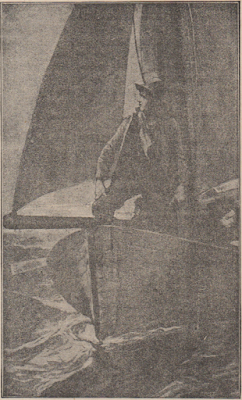(c.AD 482-537)
(Welsh: Cadwy; Latin: Cadorius; English: Cador)
Cado appears in Arthurian literary sources as Cador, Earl of Cornwall. He is first mentioned in Geoffrey of Monmouth's History of the Kings of Britain (1136); but, by 1457, his title had mistakenly transformed him into King Arthur's elder maternal half-brother, the son of Gorlois, variously called Duke of Tintagel or Earl of Cornwall.
In fact, Cado succeeded his father, Gerren Llyngesoc, as King of Dumnonia. His main stronghold was probably the hillfort of South Cadbury in Somerset where Leslie Alcock has excavated a sub-Roman (5th/6th century) gateway and large feasting hall. The name means "Cado's Fort" and was, no doubt, one of Cado's many palaces, despite the excavators' attempts to link the site with King Arthur's Camelot. Tintagel may have been a more southerly Summer residence.
The ageing Arthur was Cado's maternal cousin as well as his Over-King and, according to literary tradition, the two fought together many times against the Saxons and other enemies, including the famous Seige of Mount Badon.
Arthur visited Cado often in the West Country, usually staying with his friend and subordinate at (Caer or) Din-Draithou, now known as Dunster in West Somerset. It was while here that St. Carannog arrived looking for his floating altar, which he had promised to follow and preach wherever it landed. Arthur would only reveal it's whereabouts if Carannog would rid Dumnonia of a terrible dragon that was terrorising the people of Carrrum (Carhampton). St. Carannog quickly despatched the serpent, and the High-King was forced to hand over the altar which he had been trying to use as a table. Carannog was given Carrum by the two Kings in gratitude for his efforts. Cado was also instrumental in restoring Queen Guinevere to her throne after she had been kidnapped by his love-sick subordinate, Sub-King Melwas of Glastening (what became Somerset).
Cado was great friends with his brother-in-law, King Carodog Freichfras (Strong-Arm) of Gwent (Wales) & Vannetais (Brittany). He was with Caradog when the latter confronted the evil wizard, Eliafres, about his parentage. Eliafres refused to answer Caradog's accusations and caused a serpent to entwine itself around the young man's arm. It took the combined strength of Cado and Caradog's first wife to remove the creature, and henceforth, poor Caradog became known as Briefbras or "short arm"!
Cado probably died at the beginning of the 6th century. Traditionally this was at the Battle of Camlann (AD 537), after which he was buried in the Condolden (or Cadon) Barrow near Camelford in Cerniw.
(c.AD 482-537)(Welsh: Cadwy; Latin: Cadorius; English: Cador)
Cado appears in Arthurian literary sources as Cador, Earl of Cornwall. He is first mentioned in Geoffrey of Monmouth's History of the Kings of Britain (1136); but, by 1457, his title had mistakenly transformed him into King Arthur's elder maternal half-brother, the son of Gorlois, variously called Duke of Tintagel or Earl of Cornwall.
In fact, Cado succeeded his father, Gerren Llyngesoc, as King of Dumnonia. His main stronghold was probably the hillfort of South Cadbury in Somerset where Leslie Alcock has excavated a sub-Roman (5th/6th century) gateway and large feasting hall. The name means "Cado's Fort" and was, no doubt, one of Cado's many palaces, despite the excavators' attempts to link the site with King Arthur's Camelot. Tintagel may have been a more southerly Summer residence.
The ageing Arthur was Cado's maternal cousin as well as his Over-King and, according to literary tradition, the two fought together many times against the Saxons and other enemies, including the famous Seige of Mount Badon.
Arthur visited Cado often in the West Country, usually staying with his friend and subordinate at (Caer or) Din-Draithou, now known as Dunster in West Somerset. It was while here that St. Carannog arrived looking for his floating altar, which he had promised to follow and preach wherever it landed. Arthur would only reveal it's whereabouts if Carannog would rid Dumnonia of a terrible dragon that was terrorising the people of Carrrum (Carhampton). St. Carannog quickly despatched the serpent, and the High-King was forced to hand over the altar which he had been trying to use as a table. Carannog was given Carrum by the two Kings in gratitude for his efforts. Cado was also instrumental in restoring Queen Guinevere to her throne after she had been kidnapped by his love-sick subordinate, Sub-King Melwas of Glastening (what became Somerset).
Cado was great friends with his brother-in-law, King Carodog Freichfras (Strong-Arm) of Gwent (Wales) & Vannetais (Brittany). He was with Caradog when the latter confronted the evil wizard, Eliafres, about his parentage. Eliafres refused to answer Caradog's accusations and caused a serpent to entwine itself around the young man's arm. It took the combined strength of Cado and Caradog's first wife to remove the creature, and henceforth, poor Caradog became known as Briefbras or "short arm"!
Cado probably died at the beginning of the 6th century. Traditionally this was at the Battle of Camlann (AD 537), after which he was buried in the Condolden (or Cadon) Barrow near Camelford in Cerniw.


